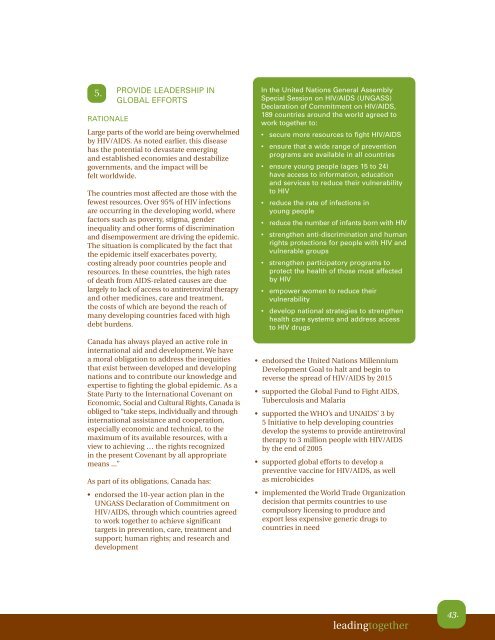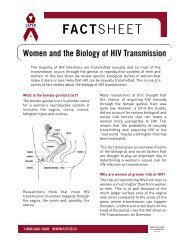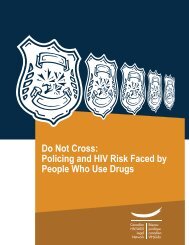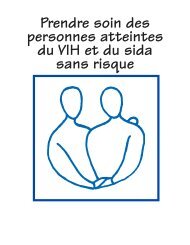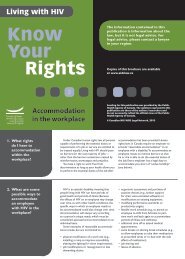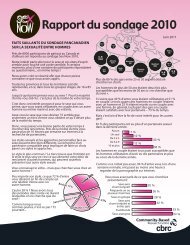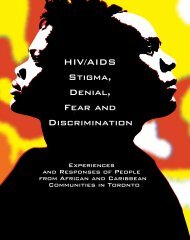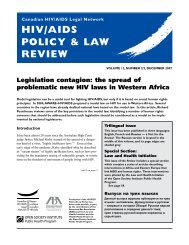leadingtogether: - CATIE
leadingtogether: - CATIE
leadingtogether: - CATIE
- No tags were found...
Create successful ePaper yourself
Turn your PDF publications into a flip-book with our unique Google optimized e-Paper software.
5.RATIONALEPROVIDE LEADERSHIP INGLOBAL EFFORTSLarge parts of the world are being overwhelmedby HIV/AIDS. As noted earlier, this diseasehas the potential to devastate emergingand established economies and destabilizegovernments, and the impact will befelt worldwide.The countries most affected are those with thefewest resources. Over 95% of HIV infectionsare occurring in the developing world, wherefactors such as poverty, stigma, genderinequality and other forms of discriminationand disempowerment are driving the epidemic.The situation is complicated by the fact thatthe epidemic itself exacerbates poverty,costing already poor countries people andresources. In these countries, the high ratesof death from AIDS-related causes are duelargely to lack of access to antiretroviral therapyand other medicines, care and treatment,the costs of which are beyond the reach ofmany developing countries faced with highdebt burdens.Canada has always played an active role ininternational aid and development. We havea moral obligation to address the inequitiesthat exist between developed and developingnations and to contribute our knowledge andexpertise to fighting the global epidemic. As aState Party to the International Covenant onEconomic, Social and Cultural Rights, Canada isobliged to “take steps, individually and throughinternational assistance and cooperation,especially economic and technical, to themaximum of its available resources, with aview to achieving … the rights recognizedin the present Covenant by all appropriatemeans ...”As part of its obligations, Canada has:• endorsed the 10-year action plan in theUNGASS Declaration of Commitment onHIV/AIDS, through which countries agreedto work together to achieve significanttargets in prevention, care, treatment andsupport; human rights; and research anddevelopmentIn the United Nations General AssemblySpecial Session on HIV/AIDS (UNGASS)Declaration of Commitment on HIV/AIDS,189 countries around the world agreed towork together to:• secure more resources to fight HIV/AIDS• ensure that a wide range of preventionprograms are available in all countries• ensure young people (ages 15 to 24)have access to information, educationand services to reduce their vulnerabilityto HIV• reduce the rate of infections inyoung people• reduce the number of infants born with HIV• strengthen anti-discrimination and humanrights protections for people with HIV andvulnerable groups• strengthen participatory programs toprotect the health of those most affectedby HIV• empower women to reduce theirvulnerability• develop national strategies to strengthenhealth care systems and address accessto HIV drugs• endorsed the United Nations MillenniumDevelopment Goal to halt and begin toreverse the spread of HIV/AIDS by 2015• supported the Global Fund to Fight AIDS,Tuberculosis and Malaria• supported the WHO’s and UNAIDS’ 3 by5 Initiative to help developing countriesdevelop the systems to provide antiretroviraltherapy to 3 million people with HIV/AIDSby the end of 2005• supported global efforts to develop apreventive vaccine for HIV/AIDS, as wellas microbicides• implemented the World Trade Organizationdecision that permits countries to usecompulsory licensing to produce andexport less expensive generic drugs tocountries in need<strong>leadingtogether</strong>43.


